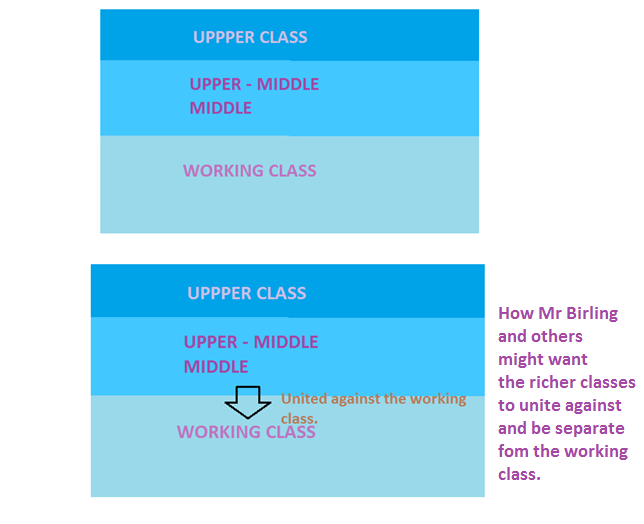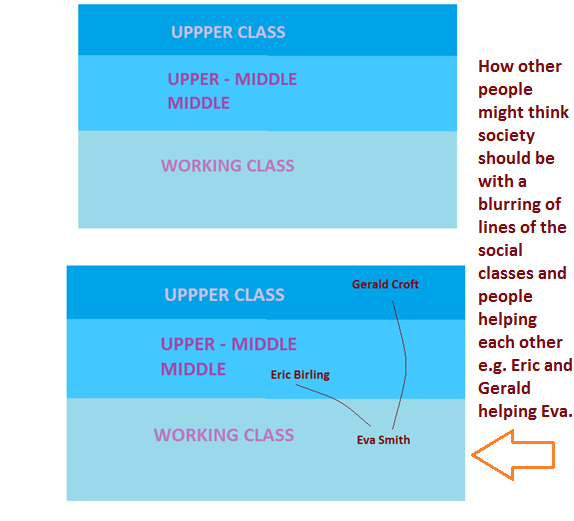Gerald Croft, a character analysis
The role/function of Gerlad’s character in the play. We have looked at the reasons why J.B. Priestley created the other characters and they purpose they serve in the play and the message that the politically active J.B. Priestley was trying to promote. In terms of Gerald.
- He represents the social hierarchy present within British society at that time with Mr Birling thinking he is socially progressing and going ‘upwards’ by his daughter marrying someone from a richer and more established family.
- Despite his social status and wealth, Priestley shows us that even a man from a rich family such as Gerald can be a flawed character, that the rich or higher classes in society are not inherently more virtuous or better than the working class. In other words Priestley is promoting equality by essentially saying ‘look we are all the same, rich or poor, none of us are perfect.’
In this particular regard, this can be applied to any of the Birlings and Gerald as well with Priestley saying ‘look just because you have money doesn’t mean you are happy or perfect.’ In other words the limitations of capitalism and money to provide complete happiness but in the context of this play with the negative impact is has on poorer people such as Eva Smith.
Priestley descibes Gerald as ‘”an attractive chap about thirty … very much the easy well-bred young-man-about-town.” This external attractiveness is in contrast with a perhaps internal ugliness. In fact in a much larger sense this could be said about the whole play. British society was much more divided on rigid class lines back in the 1940s then it is now and few amongst the working class would have had the ‘privilege’ of having a ‘fly-on-the-wall’ view of the dinner in a wealthy, ‘successful’ British family.
In this play they are privy to some of the inner goings on in one particular wealthy family and can see that like Gerald Croft, the family and their lives might appear externally very attractive but internally they have their flaws and their struggles, their ‘ugliness’. The facade of glamour hides an inner world of problems. Despite the facade of a happy couple, Sheila and Gerald, we find that behind the scenes Gerald had been cheating on Sheila and sleeping with Eva. What is also interesting to note here is that though socially Gerald may be ‘higher’ than Sheila. In terms of character Sheila is actually better than Gerald in terms of loyalty.
Once again in the very classist world of Britain in the 1910s and 1940s (the period the play was set and the period it was actually written and first shown), we can see that our perception of class and its relationship to who is ‘better’ needs to be examined. On paper Gerald is ‘better’ as he is richer and from a ‘better’ family. It is arguable however in terms of moral conduct whether he is better than Sheila.
‘‘I don’t come into this suicide business.’
In Act 1 Gerald watches the inspector and cannot see how he is involved in any of this and says ‘I don’t come into this suicide business.’ This is important, because on a more fundamental level what Priestley is trying to say is that we are all interconnected and related socially. That the poor in society cannot be totally separated from the rich. Mr Birling needs working class people to make him money. Mrs Birling makes herself look better by being involved in a charity to ‘help’ working class people which as Priestley shows maybe less about philanthrophy (helping people especially when the rich help people) than about impressing others about how ‘good’ she is.
Eric fathers a child with Eva and has to deal with women from poorer backgrounds on Saturday nights in bars, thus he interacts with them or at least Eva sexually. Sheila herself cannot escape any of this. Society is one. ‘No man is an island’ is a famous phrase by the British writer John Donne. The full quote is: ‘No man is an Island, entire of it self; every man is a piece of the Continent, a part of the main‘ In fact Britain’s universal heath care system, free for everyone emerged partly as a result of the fact that poor people who were sick would ultimately lead to richer people being infected. During the global Covid crisis of 2020 both rich and poor have been infected with Covid and what one person does can affect others.
This ties in with the themes of social responsibility, class, a more equal society and so forth. Like other ironies in the play e.g. when Mr Birling wrongly predicts that the first world war will not happen, or the Titanic will sink, Gerald’s quote ‘I don’t come into this suicide business.’ is totally wrong because he very much does come in to ‘this suicide business.’ Even his usage of the term ‘business’ rather than a word like ‘tragedy’ perhaps indicate a desire to be away from what is a very ugly and unpleasant issue as well as a lack of concern for it.
Gerald cheats on Sheila with Eva.
In the beginning of act 2 there is an interesting exchange between the inspector and Gerald. Inspector: and you think young women ought to be protected against unpleasant and disturbing things? Gerald: if possible – yes. This is one of the most interesting lines in the play and it’s about women being ‘protected’. Britain was a very patriarchal society. It could be argued that when the inspector asks should women ‘be protected’.
- He is asking not only Gerald Croft but the audience and British society in general.
- ‘unpleasant and disturbing’ things may not just be ‘things’ as in events but also people, they could possibly include sexual predators, greedy capitalists and so forth.
- If women are to ‘be protected’ who is to do that? Well the answer would be men. However the men in this play have clearly failed in that include Mr Birling, Eric and of course Gerald too.
We find out that Gerald met Eva in the Palace bar and knew her as Daisy Renton. He initially denies knowing Eva or ‘Daisy’ and says: ‘Where did you get the idea that I did know [Daisy Renton]? He then admits that he met in the bar and helped her after unsolicited attention from the horrible Aldermand Meggarty, a known drunk and womanizer. He noticed Eva or ‘Daisy’ looking at him during Meggarty’s approaches to her. ‘the girl saw me looking at her and then gave me a glance that was nothing less than a cry for help. ‘ Gerald did help Eva (‘Daisy’), he gave her accommodation (he let her stay in a flat that belonged to a friend) and rescued her from Meggarty.
He cannot be said to be a wholly bad person or a greedy capitalist, he does have a conscience. However his relationship with Eva develops to levels that it shouldn’t have and assistance turns in to a romantic relationship as Gerald says: ‘I didn’t install her there so that I could make love to her … I was sorry for her … I didn’t ask for anything in return.’ though not one Gerald had huge feelings for Eva as he himself admits when asked whether he loved her: ‘it’s hard to say. I didn’t feel about her as she felt about me.’ The feelings of pity and compassion gradually developed in to feelings of some sort of attraction which led to a physical relationship but never developed in to a proper relationship. Eva was there to be as a discreet mistress but not a partner who Gerald could show others. The inspector says of Gerald:
‘He at least had some affection for her and made her happy for a time’ The words that we can use to describe Gerald’s feelings for Eva/Daisy are ‘affection’, ‘sympathy’, compassion’ but not love. Gerald is not as bad as Mr Birling who cares very little for Eva’s suffering and is very rigid. We can only speculate on this. Perhaps Priestley was trying to appeal to the more aristocratic upper classes of the time that Gerald is representative of, as opposed to the aspirational middle to upper middle class businessmen such as Mr Birling, that when they show compassion to the poor that this is something praiseworthy.
The aristocracy, upper classes had much more power in Britain back then than the likes of Mr Birling. They should be praised for helping the poor and not see it as something negative. Their relationship with the two classes below them, the upper-middle class and middle class such as Mr Birling and the working class such as Eva should not be one were they encourage the middle class to make life hard for the working class but help them.
Here are two diagrams showing the possibly different ways of showing the relationship between the different social classes.


In the second diagram we can see that Eric and Gerald are from two ‘higher classes’. For Mr Birling and perhaps a lot of the British elite in the early 20th century the two higher classes should keep their distance if not virtual complete separation from the working class. For such people the only help given to the poor is in the form of ‘charities’ where people like Mrs Birling could make a big show of how ‘generous’ they were and use it for status.
This is different from the very real human compassion and sympathy both Eric and Gerald had for Eva, perhaps because they are younger and of a different mindset, a mindset which Priestley wanted to encourage. For Priestley and others, these vertical (upwards) classes should either just be relaxed or even perhaps in the future totally eliminated. What unites us and prevails over how much money we may have is our common humanity. A humanity so tragically highlighted by the plight of Eva Smith and which should take priority over class differences. ‘ Here are some useful words when speaking about Gerald Croft or the play in general.
Useful vocabulary for GCSE students in essays and exam questions.
- Philanthropy – The desire to help others. Often used in the context of rich people helping charities or poor people.
- Interconnected – For different things to be connected or linked to each other. Priestley shows we cannot just live pretending other classes do not exist but we are all interconnected whether we like it or not.
- Fidelity – A slightly older world derived from Latin meaning being faithful to. Gerald compromised his fidelity to Sheila with his affair with Eva.
- Aspirational– Desire to achieve social prestige. Mr Birling is an aspirational businessmen and wants to be recognised and respected by people from higher social backgrounds than him. He thinks his daughter marrying Gerald Croft who is from a wealthier and socially higher family will help him with that.
- Platonic relationship – A non-sexual relationship between a man and a woman. Gerald’s relationship with Eva may have started off platonically and may have been to help Eva but it changed in to a sexual one.
Tell us what you think about Eric in the comments section below and if you have any questions!


Amazing analysis, honestly these websites give me hope I’ll pass thank you so much 🙂 keep up the hard work and have a great day